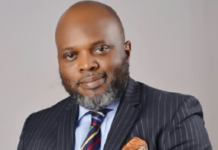The Federal Government is making plans to set up another deep seaport in the next three to four years, the Nigerian Ports Authority has disclosed.
The Managing Director of NPA, Muhammad Bello-Koko,made this public in a chat with Nigerian Ports Today, a quarterly publication of the agency, sighted by our correspondent.
Giving an update on the recently approved Badagry deep seaport, Bello-Koko said that proposals had been received for the establishment of other seaports in the country.
“If we look at what happened in the Lekki Deep seaport, it took at least three years and we expect that in the next three to four years, another deep seaport will come up. So, the Badagry deep seaport has the Federal Government’s approval.
“The other ports are still developing and a proposal has been set up for all these port locations and we are working with the Federal Ministry of Transportation and other government agencies to ensure that the business case is properly developed. I believe that after the issue of financial construction, most of them would have concluded their financial arrangement, approvals, and some of them will be working, and we expect to see at least one or two seaports in the next four to five years.”
The NPA boss, however, disclosed that the agency had witnessed an increase in revenue by over 60 to 70 per cent in 2023.
Bello-Koko said in the last eight years, the agency had been able to capture more of the cargoes that were going to neighbouring countries.
“This means that we have more cargo traffic into the country, which has added to the gross domestic profit of the country and also increased the revenue of the NPA,” he noted.
The NPA boss added that the agency had witnessed increased activities in Calabar port, stating that the agency wanted to ensure that the tariff trickles down to the end users.
“What was done has more to with Calabar port, to encourage people to bring large vessels into that port and we have seen some increase in the activity. But we are going to ensure that this tariff trickles down to the end users.”
Bello-Koko also said that the agency had set up a committee to ensure that reduced tariff is used to encourage importers to use the Calabar port.
“That is if I bring in a container here and it is costing me a million naira, if we reduce the tariff, we should be able to bring it to Calabar and there is a committee working on this. It is not only tariff that you have to make eastern ports work. You also need to ensure that there is security there, and that is why we are working with the Nigerian Navy.”
Meanwhile, Bello-Koko disclosed that the NPA had not reviewed port tariffs in 30 years, despite the rising inflation in the country.
He stated this on Tuesday night during a television interview.
According to him, the agency only reviewed its towage services between 2012 and 2014.
He claimed authority had been using the same rates since 1993.
“The NPA has not increased its tariff since 1993. The rates that we have been using since 1993 are still the same rate that we are using today. The last time the NPA increased its tariff was in 1993. Yes, the cost of doing business at the ports may be high, but we have not increased our tariff in the last 30 years.”
He said that the cost of doing business could be increasing but would not be attributed to the tariff rates of NPA.
“It was in 2012 or 2014 that the NPA increased the cost of towage. Every other tariff has remained as it is since 1993. The cost of doing business could be increasing, but it is not attributable to the tariff and rates of the NPA,” he asserted.
Bello-Koko said that the agency only harmonised the tariffs in 2012.
“What we did in 2012 was to harmonise the tariffs and merge them because they were so many. Before then, if anybody is looking for our tariffs, they will find many tariffs broken into pieces. So, what we did then was to merge them,” he explained.
On port construction, the NPA MD said the situation at Tincan Port was the worst even though every other port needs some level of rehabilitation.
“What we have been doing is palliative work, trying to manage the situation. However, it has now gotten to a stage where we feel palliative works are no longer tenable.
“So, what we have done is an authority-wide NEEDS assessment, where we checked those infrastructures. After that, we took the decision that it is time we fully reconstruct those infrastructures. Tincan Port is the one that is in the worst state, very terrible. We believe it is time to reconstruct and rehabilitate Tincan Port. There are some quays at other ports too that need rehabilitation. Some quays in Apapa, Warri, Calabar, Onne and virtually all the ports need rehabilitation. Our assessment showed that we need about $800m to rehabilitate all the ports.” he said.











